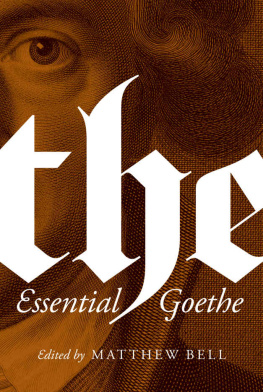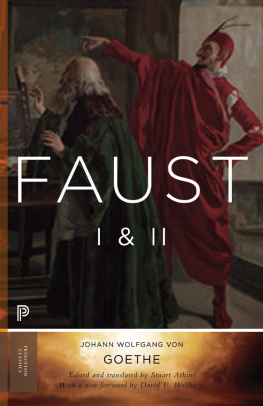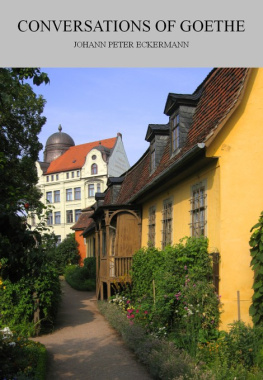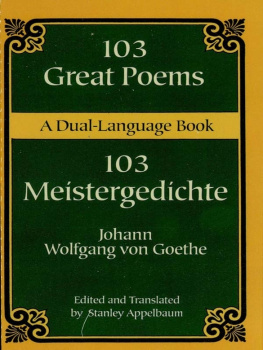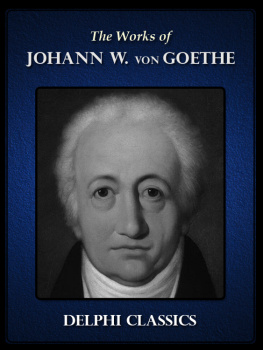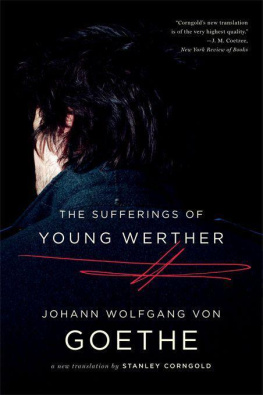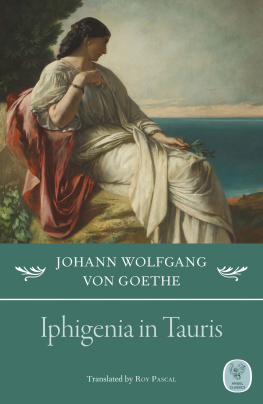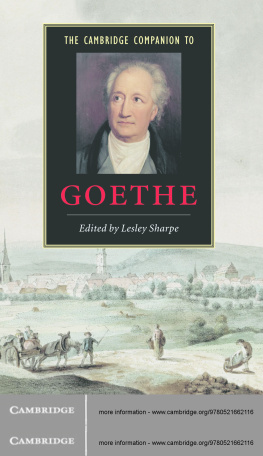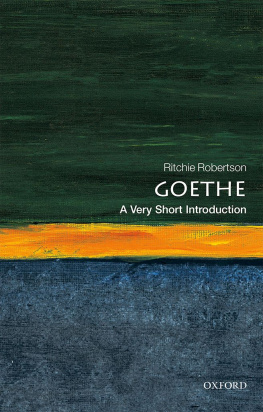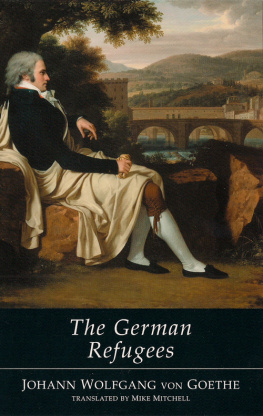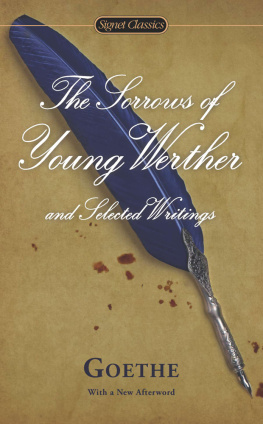Johann Wolfgang von Goethe - Elective Affinities (Penguin Classics)
Here you can read online Johann Wolfgang von Goethe - Elective Affinities (Penguin Classics) full text of the book (entire story) in english for free. Download pdf and epub, get meaning, cover and reviews about this ebook. year: 1978, publisher: Penguin Classics, genre: Art. Description of the work, (preface) as well as reviews are available. Best literature library LitArk.com created for fans of good reading and offers a wide selection of genres:
Romance novel
Science fiction
Adventure
Detective
Science
History
Home and family
Prose
Art
Politics
Computer
Non-fiction
Religion
Business
Children
Humor
Choose a favorite category and find really read worthwhile books. Enjoy immersion in the world of imagination, feel the emotions of the characters or learn something new for yourself, make an fascinating discovery.
- Book:Elective Affinities (Penguin Classics)
- Author:
- Publisher:Penguin Classics
- Genre:
- Year:1978
- Rating:4 / 5
- Favourites:Add to favourites
- Your mark:
- 80
- 1
- 2
- 3
- 4
- 5
Elective Affinities (Penguin Classics): summary, description and annotation
We offer to read an annotation, description, summary or preface (depends on what the author of the book "Elective Affinities (Penguin Classics)" wrote himself). If you haven't found the necessary information about the book — write in the comments, we will try to find it.
Johann Wolfgang von Goethe: author's other books
Who wrote Elective Affinities (Penguin Classics)? Find out the surname, the name of the author of the book and a list of all author's works by series.
Elective Affinities (Penguin Classics) — read online for free the complete book (whole text) full work
Below is the text of the book, divided by pages. System saving the place of the last page read, allows you to conveniently read the book "Elective Affinities (Penguin Classics)" online for free, without having to search again every time where you left off. Put a bookmark, and you can go to the page where you finished reading at any time.
Font size:
Interval:
Bookmark:

ELECTIVE AFFINITIES
JOHANN WOLFGANG VON GOETHE was born in Frankfurt-am-Main in 1749. He studied at Leipzig, where he showed an interest in the occult, and in Strasbourg, where Herder introduced him to Shakespeares works and to folk poetry. He produced some essays and lyrical verse, and at twenty-four wrote Gtz von Berlichingen, a play which brought him national fame and established him in the current Sturm und Drang movement. Werther, a tragic romance, was an even greater success. Goethe began work on Faust, and Egmont, another tragedy, before being invited to join the government at Weimar. His interest in the classical world led him to leave suddenly for Italy in 1786, and the Italian Journey recounts his travels there. Iphigenie auf Tauris and Torquato Tasso, classical dramas, were begun at this time. Returning to Weimar, Goethe started the second part of Faust, encouraged by Schiller. During this late period he finished the series of Wilhelm Meister books and wrote many other works, including The Oriental Divan and Elective Affinities. He also directed the State Theatre and worked on numerous scientific theories in evolutionary botany. Goethe was married in 1806. He finished Faust before he died in 1832.
R. J. HOLLINGDALE translated eleven of Nietzsches books and published two books about him; he also translated works by, among others, Schopenhauer, Goethe, E. T. A. Hoffmann, Lichtenberg and Theodor Fontane, many of these for Penguin Classics. He was the honorary president of the British Nietzsche Society. R. J. Hollingdale died on 28 September 2001. In its obituary the Guardian paid tribute to his inspired gift for German translation.
JOHANN WOLFGANG VON GOETHE
Translated with an Introduction by
R. J. HOLLINGDALE
PENGUIN BOOKS
PENGUIN BOOKS
Published by the Penguin Group
Penguin Books Ltd, 80 Strand, London WC2R 0RL, England
Penguin Group (USA) Inc., 375 Hudson Street, New York, New York 10014, USA
Penguin Books Australia Ltd, 250 Camberwell Road, Camberwell, Victoria 3124, Australia
Penguin Books Canada Ltd, 10 Alcorn Avenue, Toronto, Ontario, Canada M4V 3B2
Penguin Books India (P) Ltd, 11 Community Centre, Panchsheel Park, New Delhi 110 017, India
Penguin Group (NZ), cnr Airborne and Rosedale Roads, Albany, Auckland 1310, New Zealand
Penguin Books (South Africa) (Pty) Ltd, 24 Sturdee Avenue, Rosebank 2196, South Africa
Penguin Books Ltd, Registered Offices: 80 Strand, London WC2R 0RL, England
www.penguin.com
First published 1809
This translation first published 1971
Reprinted with a new Chronology and Further Reading 2005
19
Translation and introduction copyright R. J. Hollingdale, 1971
Chronology and Further Reading copyright David Deissner, 2005
All rights reserved
Except in the United States of America, this book is sold subject
to the condition that it shall not, by way of trade or otherwise, be lent,
re-sold, hired out, or otherwise circulated without the publishers
prior consent in any form of binding or cover other than that in
which it is published and without a similar condition including this
condition being imposed on the subsequent purchaser
EISBN: 9781101491041
GOETHE had lived with Christiane Vulpius for more than eighteen years and had had five children by her before, on 19 October 1806, he married her in the sacristy of the Hofkirche at Weimar. He was fifty-seven, she was forty-one. To Weimar society marriage was a contract not a sacrament, and divorce was a normal element of civilized life; but, like any society which still has the will to survive in it, Weimar society preserved and valued the social forms, and Goethes irregular household was an embarrassment. But he put an end to the irregularity only under external pressure. On 14 October the battle of Jena was fought and lost and was followed by the entry of the French army into Weimar: plundering and other inconveniences occurred, Goethes house was invaded, and it appears that the author of Faust was saved from a manhandling only by the valiant interposition of his Gretchen, who drove the soldiers away. The following day Napoleon arrived in the town and regularized military occupation commenced. In these circumstances, and also no doubt inspired to renewed affection by Christianes brave behaviour, Goethe at last decided he must give her the security of regular wifehood, and he put his decision into effect at once. There is no reason to think on the contrary, there is every reason to doubt that he would have taken any such step had he not been driven to it almost literally at the point of a bayonet.
But now that he was a married man, he discovered that he had all along harboured very stern moral principles with regard to the marriage tie, and he became an emphatic critic of the laxity displayed by the society in which he lived. Franz Volkmar Reinhard, who met him during the summer cure at Karlsbad in 1807, records that he was taken aback at the vehemence of Goethes utterances on the sanctity and in-dissolubility of marriage and Reinhard was head court chaplain at Dresden. There is, of course, no logical inconsistency involved in holding marriage in high regard and at the same time living in sin, but the two things do not lie very comfortably together and feeling rebels at their juxtaposition. Until his journey to Italy of 17868, Goethe avoided not only marriage but any binding relationship with women, and it was not from any strictness of principle but because until this epoch there had been a good deal of Georgie Porgie in that great man. Within a month of his return to Weimar, however, he had taken Christiane into his home and was openly living with her, in imitation, one may think, not only of the artists and bohemians with whom he had mixed while in Italy, but also of the Roman poets whose style he now began to adopt as his own: one understands Goethes classicism better when one realizes that it meant not only writing like Amors triumvirate Propertius, Catullus and Tibullus but also living like them; that classicism meant to Goethe, not coldness and rigidity and suppression of emotion, but exactly the reverse. Emotionally he was far more relaxed and happy than he had been, and he was quite content to live as if married without actually being so, which suggests that he had no very strong feelings at all on the subject of marriage, that he was pagan in that matter. When he was finally propelled into matrimony, it is clear that the acquisition of this novel status had a far more powerful effect on him than he had thought possible; and the first effect seems to have been to make him critical of the easy wedding and divorcing and wedding again sanctioned by custom among the petty aristocracy and bourgeoisie among which he moved.
In the winter of 18078, however, a complication appeared in the person of a young lady with the lovely name of Minna Herzlieb. Minna was the foster-daughter of the printer and publisher Karl Friedrich Frommann, at whose home in Jena Goethe had first met her in 1803; then she had been only a girl, but now she had reached the ripe old age of eighteen, and Goethe began to feel towards her an emotion which, while again not involving any logical inconsistency with a high regard for marriage, does not lie very comfortably beside it. He fell in love with Minna Herzlieb: the first of the affairs of his later life with women far younger than he which, because of the difference in ages, could come to nothing in the prosaic world and were for that reason sublimated into poetry. Its first product was the cycle of seventeen sonnets written as a duel with Minnas other admirer, the Romantic poet Zacharias Werner, who was nineteen years younger than Goethe and, having just dissolved his third marriage, once more a single man. The weapons were of Werners choosing: he was a specialist in Italian sonnets, while to Goethe it was a strange form. But to challenge Goethe to a contest of verse-writing was a foolhardy and foredoomed undertaking, for he was and remains the heavyweight champion of the world in that sport. Schiller, who had to work hard at his poetry, has left on record his amazement at the ease with which Goethe could reel off poems in any and every form without any kind of effort or preparation: he could, if he wished, speak poems as other men speak slabs of prose, and the ability was clearly innate, in the way composing music was innate in Mozart. His sonnets to Frulein Herzlieb are, as one could have expected, perfect imitations of the Italian model: very smooth-flowing rhythm, effortless rhyming, each poem the vehicle of one mildly ingenious idea. But they are not serious work, and were quite inadequate as a vehicle for his passion for Minna.
Next pageFont size:
Interval:
Bookmark:
Similar books «Elective Affinities (Penguin Classics)»
Look at similar books to Elective Affinities (Penguin Classics). We have selected literature similar in name and meaning in the hope of providing readers with more options to find new, interesting, not yet read works.
Discussion, reviews of the book Elective Affinities (Penguin Classics) and just readers' own opinions. Leave your comments, write what you think about the work, its meaning or the main characters. Specify what exactly you liked and what you didn't like, and why you think so.


